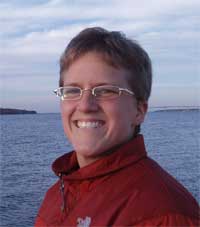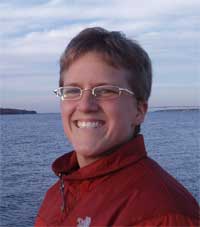 Virginia native to meet Congressional delegation, discuss science funding
Virginia native to meet Congressional delegation, discuss science funding
NARRAGANSETT, R.I. – April 1, 2010 – A doctoral candidate at the University of Rhode Island’s Graduate School of Oceanography has been selected one of three recipients of the 2010 Emerging Public Policy Leadership Award from the American Institute of Biological Sciences.
Leslie Smith, of Fairfax, Va., was recognized for her demonstrated interest and aptitude for contributing to science and public policy. The award will enable Smith to travel to Washington, D.C., later this month to meet with members of Congress from the Northeast and attend a briefing on the federal budget for scientific research.
“This is a great opportunity to meet with Congress and not just tell them about science but to tell them why science is important,” Smith said. “The majority of my outreach thus far has involved synthesizing and communicating scientific information to policymakers and the public. But it’s a whole different ball game talking to Congress and not just telling them information about the environment, but about the necessity of scientific research itself and why it should be a federal priority.”
Smith is studying biological oceanography at URI after earning a bachelor’s degree in biology from Davidson College in 2006. Her career goal is to serve as a liaison between scientists and the public to translate science for non-scientists.
“Knowledge is power, and if the public can’t understand the science needed to inform effective government decision making, then how can the public affect change?” she asked. “It’s vital to translate science to the public, but we also need to fund scientific research so scientists can answer environmental questions. If you have strong support of science in Congress, with priorities to fund research and explicitly look to scientists for answers, then that mindset will trickle down to the public.
“This award will provide another tool in my communication tool belt,” she added. “If I know the language of government, it will help me translate science and public policy even better.”
For her doctoral research, Smith is studying the relationship between water column metabolism and low oxygen events in Narragansett Bay. She said that the oxygen levels in the Bay vary considerably from year to year and from place to place.
“There are definitely hot spots of low oxygen in the Bay, especially around the Providence River and Greenwich Bay,” Smith said. “We can trace it to where human population is greatest and where waste water effluent is coming into the Bay. Low oxygen in East Greenwich, for instance, is not just affecting Greenwich Bay; it’s affecting wherever the water in Greenwich Bay flows.”
During her field work, she travels throughout Narragansett Bay to collect water samples and drop sensors to analyze the water column, and then she spends long hours in her lab analyzing her samples. One of her more significant findings is the strong influence of water column stratification on these low oxygen events. Stratification occurs when distinct layers of warm and cold water form in the Bay. “The physical structure of the water column seems to make a significant difference in low oxygen events,” Smith said.
The URI student expects to earn her Ph.D. from URI this summer or fall, at which time she hopes to find a job where she can help translate science for the public, perhaps as an advisor to government officials, for a non-profit agency, or as an environmental consultant.
“I like the idea of synthesizing information, gleaning the important elements, and putting it into packages to inform the people,” said Smith. “I’m an easily excitable person, so I can fit myself into whatever position I find and get excited about it.”

